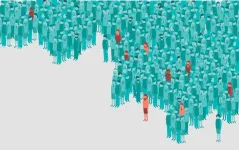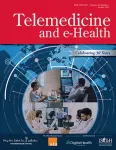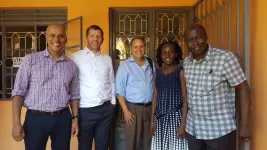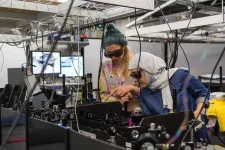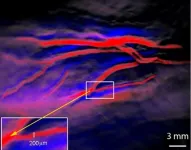(Press-News.org) A startling number of people conceal an infectious illness to avoid missing work, travel, or social events, new research at the University of Michigan suggests.
The findings are reported in Psychological Science, a journal of the Association for Psychological Science. Across a series of studies involving healthy and sick adults, 75% of the 4,110 participants said they had either hidden an infectious illness from others at least once or might do so in the future. Many participants reported boarding planes, going on dates, and engaging in other social interactions while secretly sick. More than 61% of healthcare workers participating in the study also said they had concealed an infectious illness.
Interestingly, the researchers found a difference between how people believe they would act when ill and how they actually behave, said Wilson N. Merrell, a doctoral candidate and lead author on the study.
“Healthy people forecasted that they would be unlikely to hide harmful illnesses—those that spread easily and have severe symptoms—but actively sick people reported high levels of concealment regardless of how harmful their illness was to others,” Merrell said.
In the first study, Merrell and his colleagues—psychology professor Joshua M. Ackerman and PhD student Soyeon Choi—recruited 399 university healthcare employees and 505 students. The participants reported the number of days they felt symptoms of an infectious illness, starting in March 2020, when the COVID-19 pandemic began. They then rated how often they actively covered up symptoms from others, came to campus or work without telling others they were feeling ill, or falsified mandatory symptom screeners that the university had required for anyone using campus facilities.
More than 70% of the participants reported covering up their symptoms. Many said they hid their illness because it would conflict with social plans, while a small percentage of participants cited pressure from institutional policies (e.g., lack of paid time off). Only five participants reported hiding a COVID-19 infection.
In a second study, the researchers recruited 946 participants online and randomly assigned them to one of nine conditions in which they imagined being either moderately or severely sick while in a social situation. In each condition, the risk of spreading the illness was designated as low, medium, or high. (To control for the special stigma associated with COVID-19 at the time, the researchers asked participants not to imagine being sick with that disease.) Participants were most likely to envision themselves hiding their sickness when symptom severity was low, and least likely to conceal when symptoms were severe and highly communicable.
In another study, Merrell and colleagues used an online research tool to recruit 900 people—
including some who were actively sick—and asked them to rate the transmissibility of their real or imagined illness. The participants were also asked to rate their likelihood of covering up an illness in a hypothetical meeting with another person.
Results showed that compared to healthy participants who only imagined being sick, those who were actively ill were more likely to conceal their illness regardless of its transmissibility.
“This suggests that sick people and healthy people evaluate the consequences of concealment in different ways,” Merrell said, “with sick people being relatively insensitive to how spreadable and severe their illness may be for others.”
The COVID-19 crisis may have shaped the way the participants thought about concealing an illness, Merrell said, adding that future research could explore how ecological factors (e.g., pandemics) and medical advances such as vaccines influence people’s disease-related behavior. The research team is also expanding this line of investigation to other countries to uncover potential cultural differences in concealment behaviors, he said.
Overall, the findings carry significant public health implications, illuminating the motivations and tradeoffs we make in social interactions when we’re sick, Merrell added.
“After all, people tend to react negatively to, find less attractive, and steer clear of people who are sick with infectious illness,” he said. “It therefore makes sense that we may take steps to cover up our sickness in social situations. This suggests that solutions to the problem of disease concealment may need to rely on more than just individual good will.”
Reporters may request a copy of the article, “When and why people conceal infectious disease,” by emailing news@psychologicalscience.org.
The Association for Psychological Science is the scientific home of thousands of leading psychological science researchers, practitioners, teachers, and students from around the world. APS is dedicated to advancing scientific psychology across disciplinary and geographic borders and committed to disseminating psychological science to the public, incentivizing global collaboration among researchers, catalyzing the further development of psychological science, and promoting the application of psychological science to public policy.
END
People are inclined to hide a contagious illness while around others, research shows
2024-01-29
ELSE PRESS RELEASES FROM THIS DATE:
Racial and ethnic differences in hypertension-related telehealth
2024-01-29
A new study in the peer-reviewed journal Telemedicine and e-Health found that hypertension management via telehealth increased among Medicaid recipients regardless of race and ethnicity during the COVID-19 pandemic. Click here to read the article now.
Jun Soo Lee, PhD, from the Centers for Disease Control and Prevention (CDC), and coauthors, reported that from February-April 2023, the number of hypertension-related telehealth outpatient visits per 100 persons increased from 0.01 to 6.13, and the number of hypertension-related in-person visits decreased from 61.88 to 52.63.
The investigators ...
Henry Ford Health helps advance precision medicine research in Michigan
2024-01-29
Michiganders will continue to have the opportunity to advance medical research aimed at advancing individualized health care through a renewed award to Henry Ford Health + Michigan State University Health Sciences from the National Institutes of Health’s (NIH) All of Us Research Program. The award includes $18.3 million in initial funding to support a consortium of 8 health care provider organizations with a presence in 16 states.
Henry Ford has led the consortium since 2017. The renewed award allows participation to continue until at least 2028. The multimillion-dollar multi-year award represents the largest NIH research grant in Henry Ford’s 108-year history.
All ...
Jobs and geography may affect hearing: New study maps hearing loss by state and county across the US
2024-01-29
Chicago, IL – January 24, 2024 – The first study to map the prevalence of bilateral hearing loss in the United States by state and county finds that rates of hearing loss are higher among men, non-Hispanic Whites, and residents of rural areas. Bilateral hearing loss is hearing loss in both ears.
West Virginia, Alaska, Wyoming, Oklahoma, and Arizona had the highest rates of hearing loss, while the District of Columbia, New Jersey, New York, Maryland, and Connecticut had the lowest (see top ten highest and ...
UChicago engineer driving key role in Great Lakes water transformation
2024-01-29
The Chicago-based Great Lakes ReNEW coalition has been awarded one of the largest, if not the largest, climate awards in the city’s history – up to $160 million over 10 years as one of the inaugural U.S. National Science Foundation’s Regional Innovation Engines.
Authorized in the “CHIPS and Science Act of 2022,” the NSF Engines program is designed to support the development of diverse regional coalitions of universities, local governments, the private sector and nonprofits to create solutions to today’s pressing issues.
Selected from an initial pool of more ...
Hydroxyurea significantly reduces infections in children with sickle cell anemia
2024-01-29
INDIANAPOLIS -- Clinical research led by Indiana University School of Medicine investigators and their collaborators in Uganda has revealed that hydroxyurea significantly reduces infections in children with sickle cell anemia. Their latest findings enhance strong evidence of hydroxyurea’s effectiveness and could ultimately reduce death in children in Africa, the continent most burdened by the disease.
The group’s research, recently published in the journal Blood, revealed that hydroxyurea treatment resulted in a remarkable ...
University of Manchester and SPIE announce $1 million endowment for postgraduate scholarships
2024-01-29
The University of Manchester and SPIE, the international society for optics and photonics have announced the establishment of the SPIE-Manchester Postgraduate Scholarship in Photonics.
The $500k gift from the SPIE Endowment Matching Program will be matched 100% by the University and will be used to support both early-career and returning researchers from the University’s Photon Science Institute in partnership with the Royce Institute, the UK’s national institute for advanced materials research and innovation.
The partnership was announced today (29 January) during the SPIE Photonics West conference in San Francisco.
Photonics is the study of light and its interactions ...
Argonne scientists help scale up nanomaterials for sustainable manufacturing
2024-01-29
New material is self-assembling, long-lasting and recyclable.
As electronic devices get smaller, the materials needed to create them get smaller as well. Nanoscience is the study of extremely small materials that find uses in energy storage, electronics, health and safety applications and more.
Now a team led by the U.S. Department of Energy’s (DOE) Lawrence Berkeley National Laboratory has developed a new self-assembly method to fabricate multilayered 2D nanosheets. A nanosheet is an extremely small, lasagna-like material made of ultrathin layers of polymers and nanoparticles.
These nanosheets have significantly ...
OU scientists tests revolutionary imaging technique for pancreatic cancer
2024-01-29
Researchers at OU Health Stephenson Cancer Center at the University of Oklahoma Health Sciences have embarked on a revolutionary new research study that could improve the detection of a deadly disease — pancreatic cancer — and give patients a chance to live longer, healthier lives.
The research focuses on an innovative combination of imaging techniques: a newly created contrast agent that recognizes pancreatic cancer cells, paired with Multispectral Optoacoustic Tomography, or MSOT. Together, the approach can detect pancreatic cancer cells the width of an eyelash ...
Rising sea levels could lead to more methane emitted from wetlands
2024-01-29
As sea levels rise due to global warming, ecosystems are being altered. One small silver lining, scientists believed, was that the tidal wetlands found in estuaries might produce less methane – a potent greenhouse gas – as the increasing influx of seawater makes these habitats less hospitable to methane-producing microbes.
However, research from biologists at Lawrence Berkeley National Laboratory (Berkeley Lab) and UC Berkeley indicates that these assumptions aren’t always true. After examining the microbial, chemical, and geological features of 11 wetland zones, the team found that a wetland region exposed ...
Study urges people to think twice before going on a diet
2024-01-29
A new qualitative study highlights the negative interpersonal and psychological consequences associated with “yo-yo dieting,” also known as weight cycling. The work underscores how toxic yo-yo dieting can be and how difficult it can be for people to break the cycle.
“Yo-yo dieting – unintentionally gaining weight and dieting to lose weight only to gain it back and restart the cycle – is a prevalent part of American culture, with fad diets and lose-weight-quick plans or drugs normalized as people pursue beauty ...
